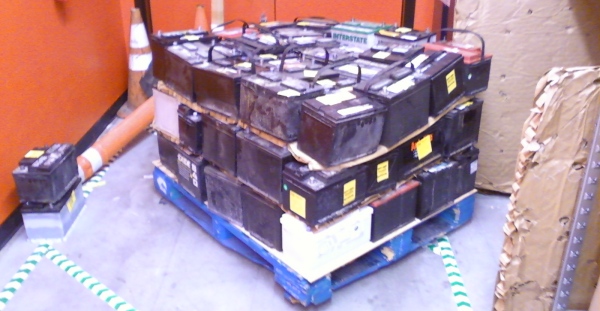The big paradox of green, recyclable batteries
More exactly, of green AND recyclable batteries.
The world needs to Crack Battery Recycling, Fast, and this also involves solving a paradox.

<u><em><strong>CAPTION:</strong>
<a href="https://en.wikipedia.org/wiki/Battery_recycling" target="_blank">Batteries collected for recycling, source: Wikipedia</a>
</em></u>
The move to electrification of transportation, from cars to trains generates mountains of batteries that must NOT end up in landfills. The paradox is that it is much easier to achieve that goal if the batteries contain highly toxic, highly troublesome substances, that is if they are made in the most anti-ecological way possible. Quoting from Wired:
“Today, cobalt is the most sought-after material used in batteries. In its raw form, [cobalt] is predominantly sourced from the Democratic Republic of Congo, where miners work in perilous conditions. The world’s major electric car manufacturers are already moving away from cobalt, deterred by the human rights abuses, shortages in the supply chain, and fluctuating prices."
And here comes the paradox:
“That raises the question of whether recyclers will still find it worthwhile to dismantle newer battery types lacking the most valuable ingredients. When you move to more sustainable materials, and lower cost materials, the incentive to recycle and recover them diminishes”.
The solution is clear, just politically hard to manage as quickly as it would be needed: “the industry needs to rethink its approach. Today’s recycling methods are crude and designed to extract only high-value materials from the cells. “
Who writes this, why, and how to help
I am Marco Fioretti, tech writer and aspiring polymath doing human-digital research and popularization.
I do it because YOUR civil rights and the quality of YOUR life depend every year more on how software is used AROUND you.
To this end, I have already shared more than a million words on this blog, without any paywall or user tracking, and am sharing the next million through a newsletter, also without any paywall.
The more direct support I get, the more I can continue to inform for free parents, teachers, decision makers, and everybody else who should know more stuff like this. You can support me with paid subscriptions to my newsletter, donations via PayPal (mfioretti@nexaima.net) or LiberaPay, or in any of the other ways listed here.THANKS for your support!